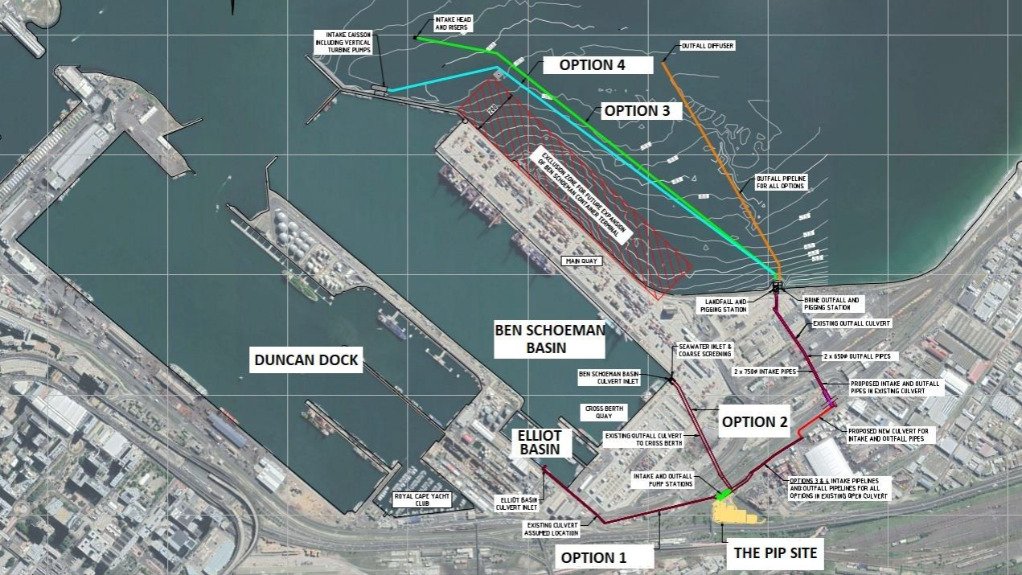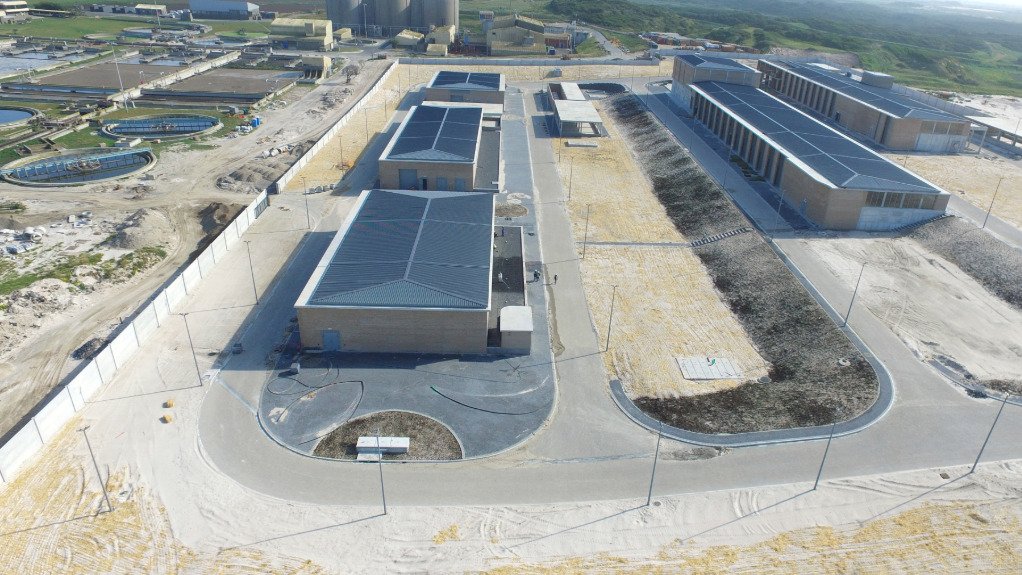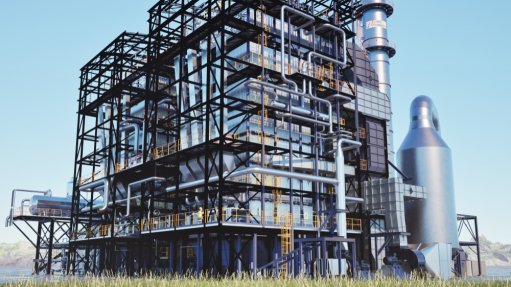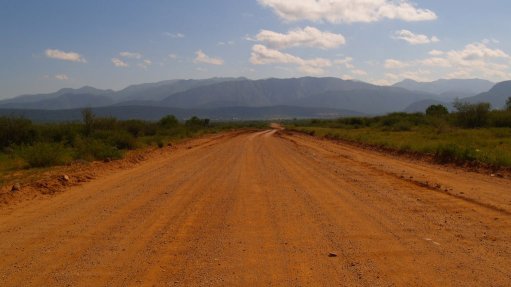Municipality progresses water projects



INFORMED DECISIONS City of Cape Town has evaluated various locations to determine the ideal site
FAURE-WARD THINKING The Faure New Water Scheme project is expected to be commissioned by 2030
Metropolitan municipality City of Cape Town (CoCT) is progressing its Paarden Eiland Desalination Plant and Faure New Water Scheme (NWS) projects to provide desalinated and purified recycled water, as part of its efforts to diversify its drinking water supply resources.
Amid climate change, unpredictable rainfall and a growing population, which adversely impact on the water supply, the city aims to add 300-million litres of water a day from various sources, including desalination, water reuse, groundwater and clearing of alien invasive species.
“The proposed permanent desalination plant is a seawater reverse osmosis plant planned for the augmentation and diversification of the city’s drinking water supply, by a capacity of between 50-million and 70-million litres a day,” says CoCT Water and Sanitation MMC Councillor Zahid Badroodien.
To ensure informed decision-making for the establishment of the permanent desalination plant, the city has established an independent advisory panel comprising 12 international and local desalination experts. The panel includes practitioners in science, engineering, public health and social sciences.
Additionally, National Treasury’s Government Technical Advisory Centre has appointed a transaction adviser on behalf of the city to investigate the most appropriate approach to deliver the desalination project. The city, in collaboration with the transaction adviser, has evaluated the viability of the proposed site, comparing it with other identified locations.
Badroodien explains that the City Council granted approval, in terms of Section 78(2) of the Municipal Systems Act (MSA), to proceed with a detailed feasibility study of alternative options for the implementation and operation of the city’s first permanent desalination plant in compliance with Section 78(3) of the MSA.
The feasibility study, along with an environmental-impact assessment, is currently in progress. The feasibility study will explore various implementation options, including the potential for external mechanisms, such as a public-private partnership (PPP).
“Any consideration into external mechanisms such as a PPP will follow the required legislative processes and approvals, including public participation processes,” he says.
Further, infrastructure required for the plant has been planned and technical feasibility studies have been completed, with the city anticipating first water from the plant in 2030.
While no specific innovative chemicals or filtration methods have been confirmed at this stage, as the plant design is dependent on the implementation option, the plant will incorporate advanced technologies that are new to the city, Badroodien explains.
He elaborates that producing desalinated drinking water that meets South African standards will require operational rigour at a significantly higher level than that of the conventional water treatment plants operated by the city.
Among the technologies under consideration is dissolved air floatation, which will address the challenge of algae blooms in Cape Town’s coastal environment.
On-site solar panels are also being considered to help power the desalination plant. However, Badroodien notes that the plant will primarily rely on grid electricity, owing to its high energy demands.
Faure NWS
The CoCT has also made progress on its Faure NWS project, which will be built at the Faure water treatment plant and reservoir. The project is currently in the planning stage, with the detailed design phase already completed.
The city is evaluating the most effective options for the implementation and operation of the project, with construction expected to begin in the 2026/27 financial year. The plant is expected to be commissioned by 2030.
Badroodien explains that the Faure NWS entails an advanced water purification plant (AWPP) with a multi-barrier process. This process will include tertiary wastewater polishing treatment, ozonation, biologically activated carbon filtration, granular activated carbon filtration, ultrafiltration, and UV light advanced oxidation and disinfection.
“Treated wastewater will be sourced from the recently-upgraded Zandvliet wastewater treatment works and further purified to drinking water standards through a multi-barrier purification process to ensure the highest applicable safety standards,” he says.
The Faure NWS infrastructure will incorporate energy-efficient and renewable-energy solutions, with the project targeting Green Star ratings for the buildings. However, the operation of the AWPP will rely on State-owned utility Eskom’s power supply.
Challenges
A significant challenge that the city has encountered is public apprehension regarding the use of purified recycled water for drinking purposes, Badroodien says.
To address these concerns, the city has undertaken initiatives to engage with key stakeholders and will implement a programme of ongoing and wider engagements with the public.
These engagements will highlight the benefits of purified recycled water and water reuse, outline potential risks and explain the measures being implemented to mitigate those risks and ensure water quality and safety.
Badroodien also acknowledges concerns from residents, including the cost of the water, intake water quality, the environmental impact of desalination and its by-products, as well as operational challenges associated with large-scale desalination.
“These concerns, among others, will be addressed through the various public engagement and participation processes to be completed as part of the project,” he concludes.
Article Enquiry
Email Article
Save Article
Feedback
To advertise email advertising@creamermedia.co.za or click here
Press Office
Announcements
What's On
Subscribe to improve your user experience...
Option 1 (equivalent of R125 a month):
Receive a weekly copy of Creamer Media's Engineering News & Mining Weekly magazine
(print copy for those in South Africa and e-magazine for those outside of South Africa)
Receive daily email newsletters
Access to full search results
Access archive of magazine back copies
Access to Projects in Progress
Access to ONE Research Report of your choice in PDF format
Option 2 (equivalent of R375 a month):
All benefits from Option 1
PLUS
Access to Creamer Media's Research Channel Africa for ALL Research Reports, in PDF format, on various industrial and mining sectors
including Electricity; Water; Energy Transition; Hydrogen; Roads, Rail and Ports; Coal; Gold; Platinum; Battery Metals; etc.
Already a subscriber?
Forgotten your password?
Receive weekly copy of Creamer Media's Engineering News & Mining Weekly magazine (print copy for those in South Africa and e-magazine for those outside of South Africa)
➕
Recieve daily email newsletters
➕
Access to full search results
➕
Access archive of magazine back copies
➕
Access to Projects in Progress
➕
Access to ONE Research Report of your choice in PDF format
RESEARCH CHANNEL AFRICA
R4500 (equivalent of R375 a month)
SUBSCRIBEAll benefits from Option 1
➕
Access to Creamer Media's Research Channel Africa for ALL Research Reports on various industrial and mining sectors, in PDF format, including on:
Electricity
➕
Water
➕
Energy Transition
➕
Hydrogen
➕
Roads, Rail and Ports
➕
Coal
➕
Gold
➕
Platinum
➕
Battery Metals
➕
etc.
Receive all benefits from Option 1 or Option 2 delivered to numerous people at your company
➕
Multiple User names and Passwords for simultaneous log-ins
➕
Intranet integration access to all in your organisation




















